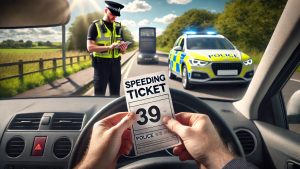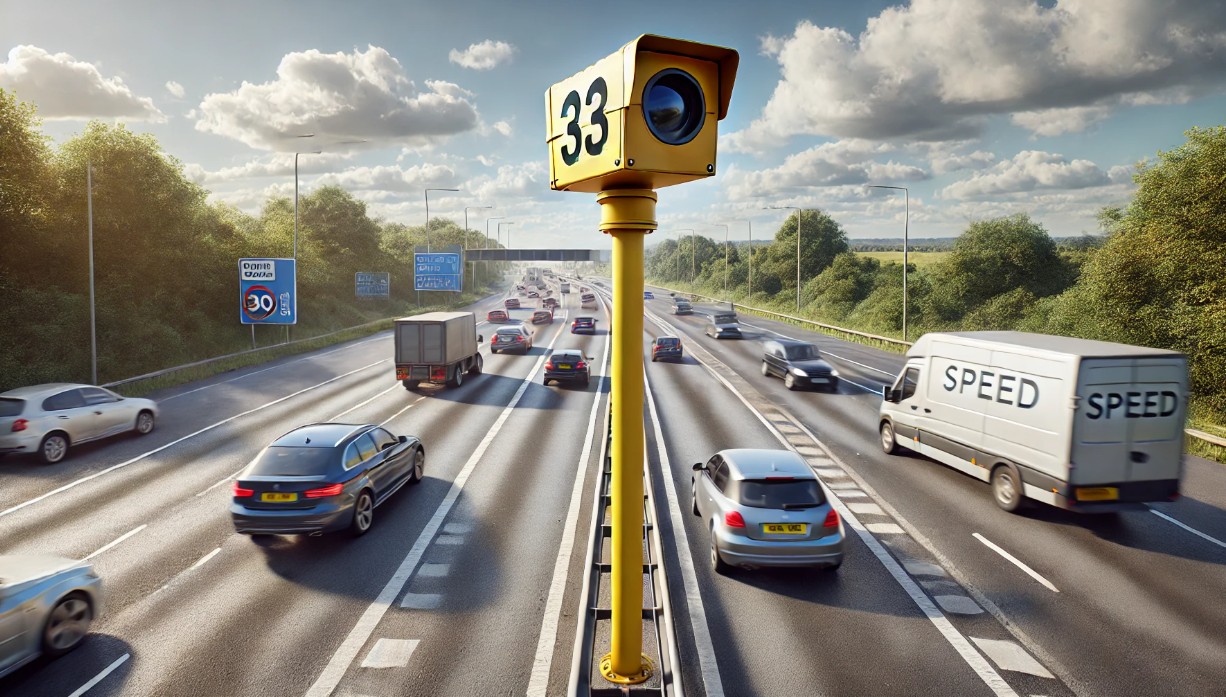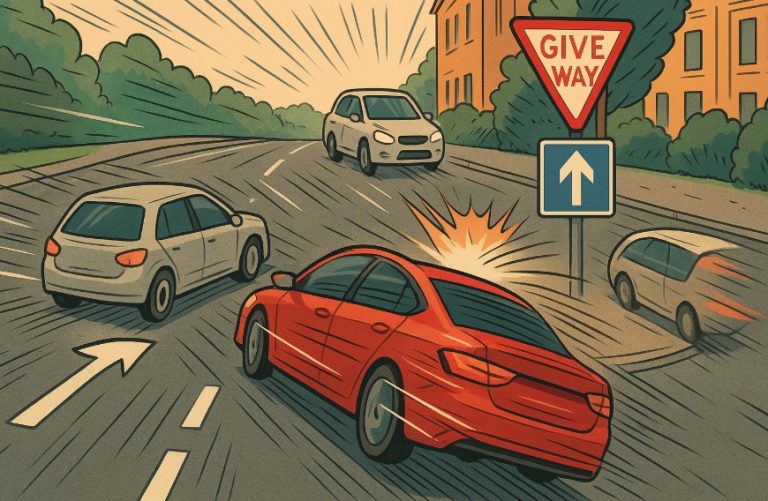Why Was I Not Offered a Speed Awareness Course?
Speeding is one of the most common driving offences in the UK, and many drivers who are caught exceeding the speed limit are given the opportunity to attend a speed awareness course instead of receiving penalty points. However, not every driver is offered this option, leading to confusion and frustration.
If you have received a Notice of Intended Prosecution (NIP) and were expecting a course but were not offered one, there could be several reasons for this. Understanding the eligibility criteria and the decision-making process of the police can help clarify why you were not given the option and what alternatives are available to you.
This guide will explain how speed awareness courses work, who qualifies, and the reasons you may not have been offered one. It will also outline what happens if you are not eligible and what steps you can take next.
What Is a Speed Awareness Course and How Does It Work?
A speed awareness course is an alternative to penalty points and fines for minor speeding offences. It is part of the National Driver Offender Retraining Scheme (NDORS) and aims to educate drivers on the dangers of speeding rather than simply punishing them.
The course typically lasts about four hours and can be completed either in person or online. During the session, drivers learn about:
- The risks of speeding and how it affects road safety.
- How to be more aware of speed limits and driving conditions.
- The consequences of excessive speed in terms of accidents and penalties.
Attending a speed awareness course allows drivers to avoid penalty points on their licence, which can help keep insurance premiums lower. However, the course is not free drivers must pay for it, with fees usually ranging from £80 to £120, depending on the location and provider.
Who Is Eligible for a Speed Awareness Course in the UK?
Not all drivers caught speeding will be given the option to attend a course. Police forces across the UK follow specific eligibility criteria when deciding whether to offer one.
The main factors that determine eligibility include:
- The speed at which the driver was caught: The offence must fall within an acceptable threshold. Generally, the police follow the guideline of offering a course to drivers caught speeding at up to 10% + 9mph over the speed limit.
- Previous offences: A driver is only eligible if they have not attended a speed awareness course within the last three years.
- Severity of the offence: Cases of excessive speeding or dangerous driving do not qualify for a course and may be referred directly to court.
- Police discretion: Not all police forces automatically offer speed awareness courses, and they have the final decision on whether a driver qualifies.
Why Was I Not Given the Option to Take a Speed Awareness Course?
If you were expecting a speed awareness course but were not offered one, there could be several possible reasons.
1. You Were Driving Too Fast

Every police force follows specific speed thresholds when offering courses. If your recorded speed exceeded these limits, you would not be eligible. The general guideline for course eligibility is:
| Speed Limit (mph) | Maximum Speed for Course (mph) |
| 20 mph | Up to 31 mph |
| 30 mph | Up to 42 mph |
| 40 mph | Up to 53 mph |
| 50 mph | Up to 64 mph |
| 60 mph | Up to 75 mph |
| 70 mph | Up to 86 mph |
If you were caught exceeding these limits, the police would not offer a course and would instead issue penalty points and a fine.
2. You Have Attended a Speed Awareness Course in the Last Three Years

Drivers can only attend a speed awareness course once every three years. If you have taken one for a previous speeding offence within this period, you will not be offered another. Instead, you will receive penalty points and a fine.
3. The Police Deemed Your Offence Too Serious

In cases where the speeding offence is considered excessive or dangerous, the police may choose to issue a Fixed Penalty Notice (FPN) or even refer the case to court. Factors that could make an offence ineligible for a speed awareness course include:
- Driving well above the speed threshold.
- Being involved in an accident due to speeding.
- Speeding in hazardous conditions, such as near schools or in heavy traffic.
4. The Police Force Handling Your Case Does Not Offer Speed Awareness Courses

Not all police forces in the UK participate in the NDORS scheme. If your speeding offence occurred in an area where the police do not offer speed awareness courses, you will not be given the option.
5. You Did Not Respond to the Notice of Intended Prosecution (NIP) on Time

Once you receive a Notice of Intended Prosecution (NIP), you must respond within 28 days. Failing to do so can result in the withdrawal of the speed awareness course option, leaving you with only the fine and penalty points.
6. Your Case Was Sent Directly to Court

If your offence was particularly serious, or if you already have multiple penalty points on your licence, the police may refer your case to court rather than offering a speed awareness course. In court, you could face heavier fines, additional penalty points, or even a driving ban.
What Happens If I Am Not Offered a Speed Awareness Course?
If you do not qualify for a speed awareness course, you will likely receive a Fixed Penalty Notice (FPN), which includes:
- A fine of £100.
- Three penalty points on your driving licence.
If the offence is more serious, you may receive a court summons, which can result in:
- Higher fines, depending on the severity of the offence.
- More than three penalty points, or even disqualification from driving.
- Increased car insurance premiums, as insurers consider penalty points a risk factor.
Can I Appeal If I Was Not Offered a Speed Awareness Course?
If you were not given the option to attend a speed awareness course, you might be wondering whether you can challenge the decision. Unfortunately, there is no formal appeal process for speed awareness courses, as they are entirely at the discretion of the police. However, that does not mean you have no options.
Understanding Police Discretion
Speed awareness courses are not a legal right but rather an alternative penalty that the police may choose to offer. The National Driver Offender Retraining Scheme (NDORS) provides guidelines, but the final decision lies with the police force handling your case.
Each police force has its own policies and may have different eligibility criteria based on their enforcement priorities, resources, and local policies. This means that while one police force may offer a course for a particular offence, another might not.
What Can You Do If You Were Not Offered a Course?
Although there is no formal appeal process, you can still take the following steps to seek clarification:
Contact the Police Force That Issued the NIP

- The first thing you can do is contact the police force that issued the Notice of Intended Prosecution (NIP).
- You can ask them why you were not offered a speed awareness course and whether you met the eligibility criteria.
- Some forces have a dedicated department handling speeding offences and may provide an explanation.
Check Whether You Met the Eligibility Criteria
- If you were hoping for a speed awareness course, review the standard eligibility criteria to see if you qualified.
- If you believe you met all the requirements and were still denied a course, you may request a reconsideration, but this is rarely granted.
Ensure That Your NIP Response Was Submitted on Time
- Speed awareness courses are usually only offered if the driver responds within 28 days of receiving the NIP.
- If you failed to respond within the deadline, you may have automatically lost the chance to attend a course.
Seek Legal Advice If Necessary
- If you feel the decision was unfair or based on incorrect information, you can consult a motoring law solicitor.
- A solicitor can review your case and advise you on whether any legal action is possible.
- However, because speed awareness courses are discretionary, legal challenges rarely succeed unless there was an administrative error.
Can You Request a Speed Awareness Course Instead of Penalty Points?
You cannot request or demand a speed awareness course if the police have not offered one. Unlike fines and penalty points, which are set by law, speed awareness courses are an alternative punishment that police offer based on their judgment.
Once the police have made their decision, it is usually final. However, if you were expecting a course and did not receive one, it is worth contacting the relevant police force for clarification.
How Can I Avoid Speeding and Future Penalties?
Avoiding speeding offences is crucial for maintaining a clean driving record, keeping insurance costs low, and ensuring road safety. Even if you were not offered a speed awareness course this time, taking steps to improve your driving habits can prevent future offences and penalties.
Be Aware of Speed Limits at All Times
Many drivers unintentionally speed because they are unaware of the changing speed limits on certain roads. Always keep an eye out for speed limit signs, especially in areas where limits can fluctuate, such as:
- School zones
- Residential areas
- Dual carriageways and motorways with variable speed limits
Modern cars often have speed limit recognition systems, and navigation apps such as Google Maps and Waze can also provide real-time speed limit alerts.
Use Technology to Stay Within Speed Limits
If you struggle to keep track of speed limits, consider using technology to assist you:
- Cruise control: If your vehicle has this feature, it can help you maintain a constant speed on motorways.
- Speed limiters: Some cars allow you to set a maximum speed, preventing you from exceeding it.
- GPS and speed camera alerts: Many navigation apps provide warnings about upcoming speed limits and speed camera locations.
Regularly Check Your Speedometer

One of the simplest ways to prevent speeding is to make a habit of checking your speedometer regularly, particularly in areas where speed limits frequently change.
It is easy to go slightly over the limit without realising, especially on downhill roads or open motorways. Developing the habit of glancing at your speedometer every few seconds can help you stay within legal limits.
Drive According to Road Conditions
Even when driving within the legal speed limit, adapting your speed to road conditions is essential for safety. Always reduce your speed in situations where visibility is low, roads are slippery, or there is heavy traffic.
Speeding is not just about exceeding the posted limit, it’s also about driving at a safe speed for the conditions. Driving too fast in rain, fog, or ice increases the risk of accidents and could still be considered careless or dangerous driving by the police.
Be Cautious in Areas with Speed Cameras
The UK has one of the most extensive speed camera networks in the world. Being aware of fixed, average speed, and mobile speed cameras can help you remain conscious of your speed.
Some key facts about UK speed cameras:
- Fixed speed cameras are placed at accident-prone locations and are always operational.
- Mobile speed cameras are used by police and can be positioned in various locations, making them harder to predict.
- Average speed cameras monitor speed over a stretch of road rather than at a single point, meaning slowing down temporarily will not help.
To avoid being caught by speed cameras, always stick to the speed limit, rather than slowing down only when approaching a camera.
Give Yourself Extra Time for Journeys

Many drivers speed because they are in a rush. Planning your journey and leaving earlier can remove the temptation to exceed the speed limit.
If you regularly find yourself running late, consider:
- Checking traffic reports in advance.
- Using alternative routes to avoid congested areas.
- Factoring in extra travel time for roadworks or delays.
Understand the Consequences of Speeding
Sometimes, simply being aware of the potential consequences can encourage better driving habits. Speeding can lead to:
- Fines and penalty points on your licence.
- Increased car insurance premiums.
- A potential driving ban if too many points accumulate.
- A higher risk of causing accidents or fatalities.
Consider Taking a Voluntary Driving Course
If you want to improve your driving skills and reduce the risk of future speeding offences, you may benefit from a defensive driving course. While these courses will not remove penalty points, they can help improve your awareness and may even lower your insurance premiums.
Conclusion
A speed awareness course is a beneficial alternative to penalty points, offering drivers the opportunity to learn from their mistakes rather than simply receiving a fine.
However, not all drivers are eligible for this option. If you were not offered a course, it is likely due to exceeding the speed threshold, having attended a course in the past three years, or other factors such as police discretion and the severity of the offence.
While there is no formal appeal process, you can contact the police force handling your case for clarification. However, once a decision has been made, it is unlikely to be overturned. To avoid future speeding offences and penalties, staying aware of speed limits, using technology to monitor speed, and improving driving habits can make a significant difference.
If you were disappointed at not being offered a course this time, focusing on safer driving practices can help ensure that you do not find yourself in the same situation again.
FAQs
What are the threshold criteria for a speed awareness course?
To be eligible for a speed awareness course, your speed must typically fall within 10% + 9 mph over the speed limit. This means that in a 30 mph zone, you must have been caught driving at no more than 42 mph to be considered for the course. However, final eligibility is at the discretion of the police.
Can I do a speed awareness course if I was doing 39 in a 30?
Yes, if you were caught doing 39 mph in a 30 mph zone, you would generally be within the eligibility range for a speed awareness course. However, eligibility also depends on factors such as whether you have taken a course in the past three years and the policies of the police force handling your case.
Will I get offered a speed awareness course if I already have points?
Having existing penalty points does not automatically disqualify you from a speed awareness course. However, the police may take into account your driving history. If you have committed multiple offences in a short period or have taken a course within the last three years, you will not be offered one.
Can I appeal if I was not offered a speed awareness course?
No, there is no formal appeal process for speed awareness courses. They are offered at the discretion of the police, and once a decision is made, it is usually final. You may contact the police force for clarification, but they are not obligated to reconsider their decision.
How long do penalty points stay on my licence?
Penalty points for speeding remain on your driving licence for four years from the date of the offence. However, they only count towards disqualification for three years.
Do all UK police forces offer speed awareness courses?
No, not all police forces in the UK participate in the National Driver Offender Retraining Scheme (NDORS). Some forces choose to issue penalty points and fines instead. It depends on the policies of the local police force handling your speeding offence.
Will taking a speed awareness course affect my insurance?
Some insurance providers may consider a speed awareness course as an indication of a previous offence, which could lead to an increase in premiums. However, since no penalty points are added to your licence, the impact on your insurance is generally lower than if you had received points.







